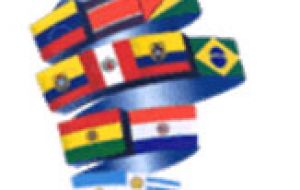MercoPress. South Atlantic News Agency
Unasur summit faces charged agenda of controversial issues
 A Venezuelan initiative to impose an “ethics responsibility” clause for the media was blocked by Uruguay and Chile
A Venezuelan initiative to impose an “ethics responsibility” clause for the media was blocked by Uruguay and Chile An “ethics responsibly” clause for the media and a strong criticism of the current financial architecture in South America and the global crisis are two controversial issues added to the already charged agenda of the Unasur summit which opens Monday in Quito, Ecuador.
The Union of South American Nations gathering of presidents was expecting two divisive issues, particularly the one referred to US forces deployed in Colombian bases and the Honduras crisis, to absorb much of the political debate.
But Venezuela’s proposal of an “ethics responsibility” clause in the final declaration triggered a strong debate since several countries see this as an attempt to restrict the freedom of the press
According to the Brazilian newspaper “O Estado de Sao Paulo” the Venezuelan delegation put forward the idea during the week-end technical meetings preparatory for the Monday summit.
The proposal alarmed the Brazilian delegation but was so strongly debated against by Uruguay and Chile that “Brazil did not need to intervene”, according to diplomatic sources quoted by the Sao Paulo daily.
With Uruguay and Chile against there is no consensus and therefore the initiative will not be included in the final declaration of the Quito summit when Chile will be handing over the pro tempore presidency of the regional group to Ecuadorean president Rafael Correa.
Brazil feared that Venezuela or any other South American country for that matter could in the future appeal to that clause to impose restrictions to the press.
The Sao Paulo newspaper also points out that Venezuela was proposing to include in the Quito declaration a paragraph on the current South American financial architecture and the global crisis, which could open the door for Unasur to adopt monetary mechanisms already approved by the Venezuela-Cuba sponsored Bolivarian Alternative for the Americas, ALBA.
If this was the case and given the recent establishment of the Sucre, as virtual money, approved by ALBA members (Venezuela, Bolivia, Nicaragua, Honduras, Cuba and Dominica) plus Ecuador, with the purpose of in a near future replace the US dollar as the regional trade currency, this could open the way for a similar path with Unasur.
According to diplomatic sources, Brazil will strongly reject the initiative and will also lobby to have it thrown out from the Foreign Affairs Ministers Council discussions and thus omitted from the Quito declaration.
Unasur is the brain child of Brazilian diplomacy and pretends to create a regional organization to deal with political, defence, security issues, with exclusion of out of the region countries (basically the US).
The issue of the US forces in Colombian bases is most challenging because a last week round of visits by Colombian president Alvaro Uribe to his peers in seven countries showed the issue was highly controversial, with some countries admitting first Colombia’s right to sovereign decisions and non interference in internal affairs.
It was precisely after Uribe’s meeting with Lula da Silva that Brazilian diplomacy said the issue should be discussed or considered at the Unasur security affairs council.
It has been anticipated that President Uribe will not be going to Quito since diplomatic relations with Ecuador have been severed for some time and because of the strong attacks, some of them personal, from Venezuela’s Hugo Chavez and Bolivia’s Evo Morales against the Colombian agreement with Washington.




Top Comments
Disclaimer & comment rulesCommenting for this story is now closed.
If you have a Facebook account, become a fan and comment on our Facebook Page!